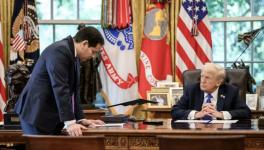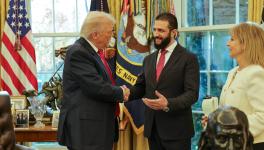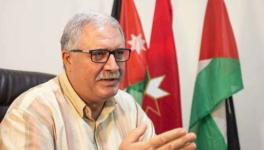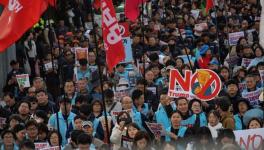The Aborted Resurrection of French Diplomacy
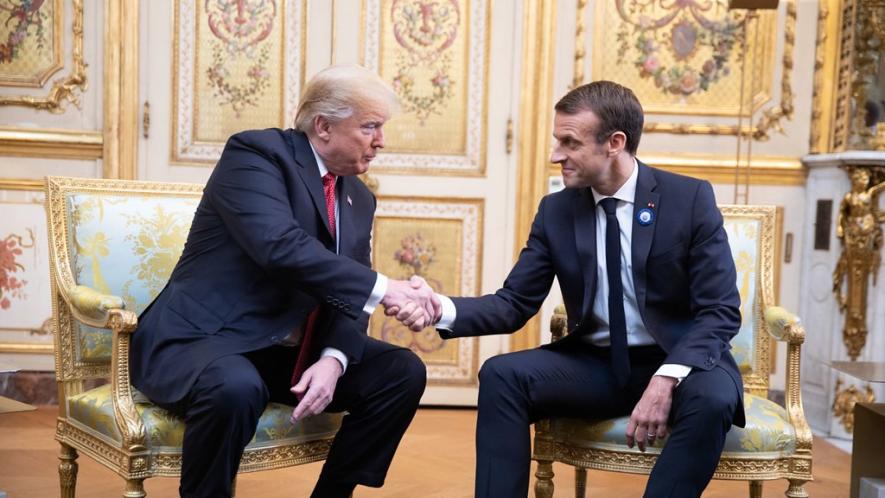
French President Emmanuel Macron and US President Donald Trump. Photo: flickr
The peace plan for Gaza proposed by the French president on September 22 before the United Nations General Assembly (UNGA) was rendered null and void by Trump’s. Trump, like his Israeli counterpart, did not even bother to mention the French president’s initiative during their joint press conference at the White House.
Announced amid much fanfare throughout the summer, President Macron’s speech officially recognizing the State of Palestine was presented as a significant and bold diplomatic maneuver intended to reaffirm France’s role as a mediator in the West Asia conflict. The French president was expected to be the first G7 leader to recognize Palestine, before his British counterpart pulled the rug out from under him by declaring recognition 24 hours earlier. Eventually, as the New York Times pointed out, apart from the US, “France has become the latest Western nation to formally recognize Palestinian sovereignty.” Marwan Bishara, a researcher at the School for Advanced Studies in the Social Sciences and a senior political analyst for Al Jazeera, pointed out that the wave of recognition by Western leaders was “an attempt to absolve themselves of charges of complicity in the current genocide.” An accusation that materialized, this summer, in the form of a complaint to the ICC, accusing President Emmanuel Macron, three key ministers and scores of MPs of facilitating Israeli crimes against Palestinians.
Reactions
Emmanuel Macron’s announcement ultimately generated very little interest. Caught between the radical Colombian President Gustavo Petro, who went as far as advocating the use of military force to prevent Israel from slaughtering the Palestinians, and the Israeli prime minister, who described Macron’s initiative as “disgraceful,” Macron gave the impression of having stayed in the middle of the ford. Meanwhile, Spain is increasingly asserting itself as a counterweight to the United States’ unconditional support for Israel — a role formerly played by France in the past. Its Prime Minister Pedro Sanchez welcomed the recognition of Palestine by France, but underlined: What is even more urgent is that there is a Palestinian people living there.” According to retired Israeli General Herzi Halevi, the death toll exceeds 200,000, with 83% of casualties. Meanwhile, the UN Special Rapporteur on the Occupied Palestinian Territories, citing scholars and scientists, put the figure at 680,000.
However, Macron’s initiative was generally well received by the French left-wingers, who saw it as a victory for popular mobilization in support of the Palestinian people, who have suffered severe repression. The Paris communist senator Ian Brossat commended the recognition but added that, “in order for it not to be an empty promise, France must take action to put an end to the genocide.”
France is a signatory to the 1951 Genocide Convention, which compels state members to prevent and punish anyone charged with the crime of genocide. To date, the countries of the European Union have not even been able to suspend the association agreements between Israel and the EU. Furthermore, Macron has been severely criticized by human rights organizations for allowing Netanyahu’s plane to use French airspace. As a signatory to the Rome Statute, France was obliged to arrest the Israeli prime minister, as he was the subject of an international arrest warrant issued by the International Court of Justice (ICJ). At the very least, it should have banned him from using its airspace.
Rima Hassan, an MP from La France Insoumise who was aboard the flotilla en route to Gaza when Macron delivered his speech in New York, before being illegally arrested and detained by the Israeli Navy, slammed the President’s duplicity. “France wishes to impose conditions of demilitarization on a people who have suffered colonization and occupation for decades, while continuing to arm the state that colonizes, occupies, and now commits genocide with impunity.” she declared. Not only does Macron’s peace plan involve disarming Hamas’, it also involves dismantling its democratically elected political wing and empowering the corrupt and discredited Palestinian Authority, whose main function is and will be to ensure the security of the occupying power.
On the right wing of the political spectrum, the time has come… for consternation. The Jewish community leadership has had the same reaction, as they are feeling the effects of what the Chief Rabbi of France, Haim Korsia, a staunch supporter of Benjamin Netanyahu, called a “U-turn” — from “the most pro-Israeli president in French history”, as he labeled President Macron. Pierre Lellouche former right wing MP and fervent defender of Israel explains Macron’s volte-face by his “narcissism … he needs to be the center of attention. He no longer has any power; he is a man who has lost three elections in a row”.
A turning point in the history of French diplomacy
Plagued by a social and political crisis, disavowed by his own MPs, Emmanuel Macron was probably looking for his own historical moment like De Villepin’s. In 2003, Jacques Chirac’s former Minister of Foreign Affairs delivered a passionate and vibrant speech against the war on Iraq at the UN General Assembly, which was warmly applauded. A turning point in the history of French diplomacy, as it was the very last time France dared to oppose the US Foreign policy in a major geopolitical issue. His successor, Nicholas Sarkozy put an end to the independent foreign policy by announcing France’s return to NATO’s military command, reversing Charles de Gaulle’s decision to walk out in protest at US domination in 1966. Since then, France’s voice in West Asia has gone missing.
“Macron’s self-diplomacy”
However, from the outset of his presidency, Emmanuel Macron has been clear about his ambition to restore France’s place in the world. Young, well-educated, self-confident, and, unlike his predecessor: an English speaker. Although, his self-confidence soon turned into arrogance. That’s how Macron got rid of the diplomatic corps in France as part of the public sector overhaul, thereby marginalizing the Ministry of Foreign Affairs, which he described as a “deep state”.
The outcome of this “self-diplomacy” is an erratic foreign policy for the least pessimistic, and a real diplomatic fiasco for the most pessimistic, specifically in North and West Africa.
As the first president to be born after the country’s last war of decolonization, Emmanuel Macron probably believed that his youth would shield him from the contentious issues of colonization and neocolonialism. This could explain why he was so casual with his African counterparts. Far too casual. Causing him to commit unfortunate diplomatic blunders that were perceived by Africans as paternalistic arrogance. Macron’s behavior angered public opinion in the Sahel region, sparking an increase in anti-French sentiment. A few years later, France was kicked out from the totality of what used to be its historical stronghold: West Africa.
Up north in the continent, in 2017, during a campaign trip to Algeria, he denounced colonialism as a “crime against humanity,” However, it took him less than 48 hours to apologize to a crowd of former French settlers in Toulon.
Since then, the President’s stance on the issue has been inconsistent, depending on who he is talking to. He may acknowledge colonial crimes or highlight its civilizational achievement.
A doublespeak, an inconsistency that has become his trademark, summed up in the words: “at the same time.” His supporters see it as the mark of a clever politician who can connect seemingly opposing or contradictory things. However, for his detractors, it is the expression of a man lacking in political or ideological spin.
Ironically, these words fit perfectly when it comes to describing his relationships with North Africa. He has somehow managed to find himself at odds with both Algeria and Morocco at the same time, even though the two neighboring countries are currently experiencing the worst diplomatic crisis in their history.
West Asia, a scene of French impotence
No other region in the world reflects the decline of French diplomacy quite like West Asia. While this decline did not begin with Macron’s first presidency, his policy of U-turns has not helped matters. From expressing unconditional support for Israel on the day of the October 7 Hamas attacks, to recognizing the State of Palestine, the French president’s West Asia policy has lacked clarity and keeps meandering.
Macron’s support to Israel went so far as to propose an international military coalition against Hamas, surprising his Israeli counterpart and sparking panic among French ambassadors in Arab capitals, who had to send a note to the Élysée Palace in protest. A year later, Macron was calling for an embargo on weapons sent to Israel, angering the Israeli prime minister in the process. However, according to the investigative outlet Disclose, France continued to supply Israel with military equipment.
Torn between the need to reconcile its international commitments and strategic alliances, and growing pressure from public opinion, President Macron will slowly come to the recognition of Palestine. Despite the shameful coverage of the genocide by the French and Western mainstream media in general, there is a shift in opinions in France, in the US, and even in Germany, where Israel is supposed to enjoy the most support in Europe. Traditional media outlets have been overwhelmed by social media, which have challenged the Israeli army’s narrative.
According to Odoxa poll institute, nearly two third of the respondents are in favor of the recognition, more importantly, however: 74% of the respondents would support the imposition of sanctions against Israel.
According to the official narrative as related by French Day Le Monde, Macron was affected by his visit to El Arich, an eastern Egyptian port-city and key transit point for Gaza-bound aid. He reportedly made his decision irrevocably during his flight back to Paris.
As the world was expecting on June 13, Macron’s solemn speech, announcing his intention to recognize Palestine, Israel, violated, once again the international law by launching a massive military offensive against Iran, compelling Macron to postpone the announcement. Although Iran was only retaliating against Israeli air strikes on its military, civilian and nuclear facilities, Macron expressed his full support for Netanyahu, stating that Israel had “the right to defend itself ”. Furthermore, France has acknowledged that its military personnel based in Jordan helped the Israeli air force by intercepting Iranian drones, despite there being no military alliance treaty between the two countries.
As the fateful date of September 22 was approaching, Emmanuel Macron used all his persuasive powers to convince Israelis and French Jews that his approach does not conflict with Israel’s interests or security. He reiterated that recognizing Palestine was the “best way to isolate Hamas,” which, according to the French President, opposes the two-state solution advocated by France.
Portrayed by both Israel and its Western allies as a bloodthirsty fanatic organization allergic to peace much like vampires are to daylight and garlic, even though Hamas amended in 2017 its charter to adopt the two-state solution, but who cares about Hamas’s political doctrines or changes in political orientation? Not Macron who continues to repeat that the only way to get rid once and for all of Hamas is to resume peace talks between Israelis and Palestinians. A peace process which would lead, according to Macron, to the “two-state solution”, an old western diplomacy’s chestnut overshadowed by the Abraham accords.
A peace process that would take the Palestinians back to the status quo ante, which led to the expansion of Israeli settlements across the West Bank, transforming the land into Swiss cheese, often compared to the South African Banthoustans under the Apartheid regime.
While the French initiative sparked outrage all over the Israeli political spectrum, whose center of gravity shifted towards the far right, it has been, however, welcomed by some intellectuals and political figures. Among them: Merav Michaeli who served as the Labor Party’s leader, Zehava Gal-On, former leader of the party Merez or the writers David Grossman and Amos Oz.
The French diplomatic move has pleased not only the Israeli left wing, but also ardent supporters of Israel in France, such as Jewish intellectual Alain Finkielkraut. Although he admits that Macron’s “zigzag diplomacy” has given him a headache, he fully supports his initiative.
Another French Jewish scholar, Frédéric Encel, teacher at Science Po, who led a seminar in 2024 devoted to “reshape the global narrative on Israel” wrote an open-ed in the weekly L’Express in which he has ardently defended the French President’s move. He rightly pointed out that the President’s opening remarks of his speech “concerns the 48 Israeli hostages, even before the disastrous fate of the population in Gaza is mentioned, and they are mentioned six times.” It is worth noting that President Macron did not mention a single time the thousands of Palestinian prisoners in Israeli jails, the release of whom was the reason for the capture of the Israeli hostages. Similarly, the French president carefully avoided offensive words such as “blockade”, “famine”, “settlement” or “genocide”.
The content of Emmanuel Macron’s speech and its timing suggests that the real objective of his diplomatic maneuver is less motivated by the well-being of Palestinians, than a rescue operation to save “private Israel” from its own madness.
The editor-in-chief of the French liberal daily Libération Dov Alfon says nothing else: “Emmanuel Macron is currently the only Western leader trying to prevent Israel’s downfall. French Jews would be wise not to hinder his efforts.” The liberal newspaper publisher knows what he’s talking about when it comes to the security of Israel, as he is a former Mossad officer.
Ultimately, if observers agree that Macron’s diplomacy has been erratic, it is worth noting that his foreign policy in West Asia has been consistent since the beginning of his first term. This is because it has aligned with the US’s main foreign policy concern in West Asia: ensuring the security of Israel.
Too late and not good enough is likely the way Macron’s initiative might be remembered, should it ever be remembered, regarding the urgency of the situation in Gaza confronted with the first genocide of the 21st century combined with the worst humanitarian crisis in modern time.
This article was written by Khaled Sid Mohand and first published by Al-Akhbar.
Courtesy: Peoples Dispatch
Get the latest reports & analysis with people's perspective on Protests, movements & deep analytical videos, discussions of the current affairs in your Telegram app. Subscribe to NewsClick's Telegram channel & get Real-Time updates on stories, as they get published on our website.











